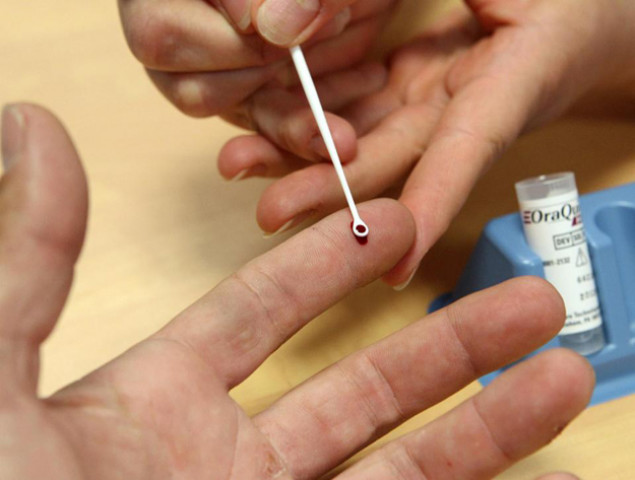Taking on big pharma: Doctors say breakthrough drug to treat hep C blocked by lobby
Studies show sofosbuvir tablets, taken with other medication, more effective than interferon

A nurse tests for hepatitis C at a hospital. PHOTO: AFP
Pakistan is one of the countries where the sale of sofosbuvir has been approved under the brand name Solvadi, distributed by a local pharmaceutical company. It was given the nod in November 2014. Yet, doctors complain, in Khyber-Pakhtunkhwa, road blocks are being thrown in the way of the drug reaching the market.
“Many companies have been manufacturing interferon injections to sell as treatment for hepatitis C,” a doctor working for a hepatitis control programme in Khyber-Pakhtunkhwa told The Express Tribune. “But once Solvadi is introduced, it will have adverse effects on the production of interferon injections as the tablets have been proved more effective as compared with interferon.”
Interferon therapy is known to have harsh side effects, including increase in blood sugar levels, drop in platelet count and nausea.
Cheaper or more effective?
Sofosbuvir tablets are made in America by Gilead Sciences and as yet only one company has the authority to supply them in Pakistan. Initially, a bottle of 28 pills cost Rs55,000.
However, according to the federal government earlier in 2015, the prices were slashed to Rs32,300 per bottle – roughly the cost for a month as it is a once-daily tablet. Medical websites put the duration of treatment anywhere between 12 to 24 weeks, depending on the type of HCV.
According to news reports at the time the decision was brought about after another local pharmaceutical managed to successfully replicate the generic drug at a much lower cost. It is not known if this company was successful in gaining approval for its cheaper tablets.
Health experts have found sofosbuvir has fewer disruptive side effects. Current reports suggest the medicine successfully helps cure hepatitis C patients; in this case, cure means ridding the blood of the virus. According to the FDA, studies showed “Sovaldi is the first drug that has demonstrated safety and efficacy to treat certain types of HCV infection without the need for co-administration of interferon.” However, it is not recommended for monotherapy – it has to be paired with other treatment depending on type of HCV.
Road blocks
While requesting anonymity, the doctors said currently over 6,000 patients were registered with the hepatitis programme and were being treated with interferon injections. “The count of unregistered patient is unknown, but it is expected to be more than 60,000.”
He said only one company has introduced the tablets in Pakistan and that, according to him, was the work of a private company.
According to the doctor, the “mafia” benefiting from the sale of interferon is the main obstacle – not only for doctors wanting to prescribe Sovaldi, but for all those fighting the deadly disease. “They [mafia] don’t care about the disease, all they care about is money.”
New hope
“Currently, the total cost [of Solvadi] to cure a patient is around Rs0.2million and a recent meeting held in this regard stressed to wait for the prices to drop further,” said another official of the programme. “It was decided to wait [to introduce the tablets] until the cost drops down to Rs50,000 or at least Rs60,000.”
He added they have at least five companies waiting for approval to start producing sofosbuvir in Pakistan but so far only one company has been supplying it in the country. This official said once several companies start supplying the drug, prices will drop automatically.
“Solvadi is the perfect cure for hepatitis C since medical report of patients after using it [showed an almost perfect response to
the drug].”
When contacted, Dr Kalimullah, head of the hepatitis control programme in K-P, told The Express Tribune the tablets should be introduced since they have shown to cure the diseases more effectively as compared with interferon injections. “Research is under way and in addition to local experts, hepatologists from other countries, including Scotland and the US, have also insisted upon introducing the tablets.”
He added they are in the process of preparing guidelines at the national level but since they still have over 0.3million vials of interferon, they have decided to wait until the stock ends. “Once the tablets are introduced, a survey will be conducted to ascertain the actual number of the hepatitis C patients.”
On July 28, the K-P government planned an integrated plan for Human Immunodeficiency Virus (HIV), hepatitis and AIDS after PC-1 of the programme was approved by the provincial government. The programme has however yet to be launched.
Published in The Express Tribune, November 30th, 2015.













COMMENTS
Comments are moderated and generally will be posted if they are on-topic and not abusive.
For more information, please see our Comments FAQ